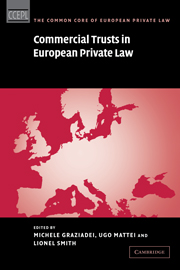Book contents
- Frontmatter
- Contents
- General editors' preface
- Preface
- Contributors to the volume
- Contributors to the case studies
- List of abbreviations
- Select bibliographies for jurisdictions represented
- Part I Setting the scene
- Part II The case studies
- Case 1 Creation and termination of the management relationship; powers of the manager
- Case 2 Investment duties
- Case 3 Conflict of interest
- Case 4 Basic insolvency situation
- Case 5 Insolvency of investment manager
- Case 6 Tracing
- Case 7 Choice of law
- Case 8 Pensions funds
- Case 9 Collective investment schemes
- Case 10 Multiple debenture holders
- Case 11 Securitisation
- Part III Conclusions
- Index
Case 7 - Choice of law
Published online by Cambridge University Press: 22 August 2009
- Frontmatter
- Contents
- General editors' preface
- Preface
- Contributors to the volume
- Contributors to the case studies
- List of abbreviations
- Select bibliographies for jurisdictions represented
- Part I Setting the scene
- Part II The case studies
- Case 1 Creation and termination of the management relationship; powers of the manager
- Case 2 Investment duties
- Case 3 Conflict of interest
- Case 4 Basic insolvency situation
- Case 5 Insolvency of investment manager
- Case 6 Tracing
- Case 7 Choice of law
- Case 8 Pensions funds
- Case 9 Collective investment schemes
- Case 10 Multiple debenture holders
- Case 11 Securitisation
- Part III Conclusions
- Index
Summary
Case
Jane manages property in the interest of her client, Monica. The property is located in your country, where both Monica and Jane live and are domiciled. In their agreement they introduce a clause stating that their relationship is a trust governed by Jersey law. Litigation arises between them. Jane claims the invalidity of the trust provision of the arrangement, and claims that local law should govern the relationship. What is the result?
Discussion
AUSTRIA
Austria has not ratified the Hague Convention on the Law Applicable to Trusts and on their Recognition. Since both of the parties live and are domiciled in Austria, and the property is located there as well, the proposed relationship does not include any foreign element; this precludes the application of the Austrian conflicts law (IPRG). Therefore, the validity of the ‘choice of law clause’ between Jane and Monica is governed by the general rules of Austrian law.
Due to the contractual autonomy of the parties, the clause is legally valid and Jersey law governs the trust or fiduciary relationship. This, however, is only true as far as the default part of Austrian law is concerned; the parties cannot ‘contract out’ of the application of mandatory provisions of Austrian law. As a result, contractual autonomy permits the applicability of Jersey law regarding the contractual part of the trust, whereas the proprietary or real aspects of the relationship follow the lex rei sitae, which is Austrian law in this case.
- Type
- Chapter
- Information
- Commercial Trusts in European Private Law , pp. 406 - 430Publisher: Cambridge University PressPrint publication year: 2005

